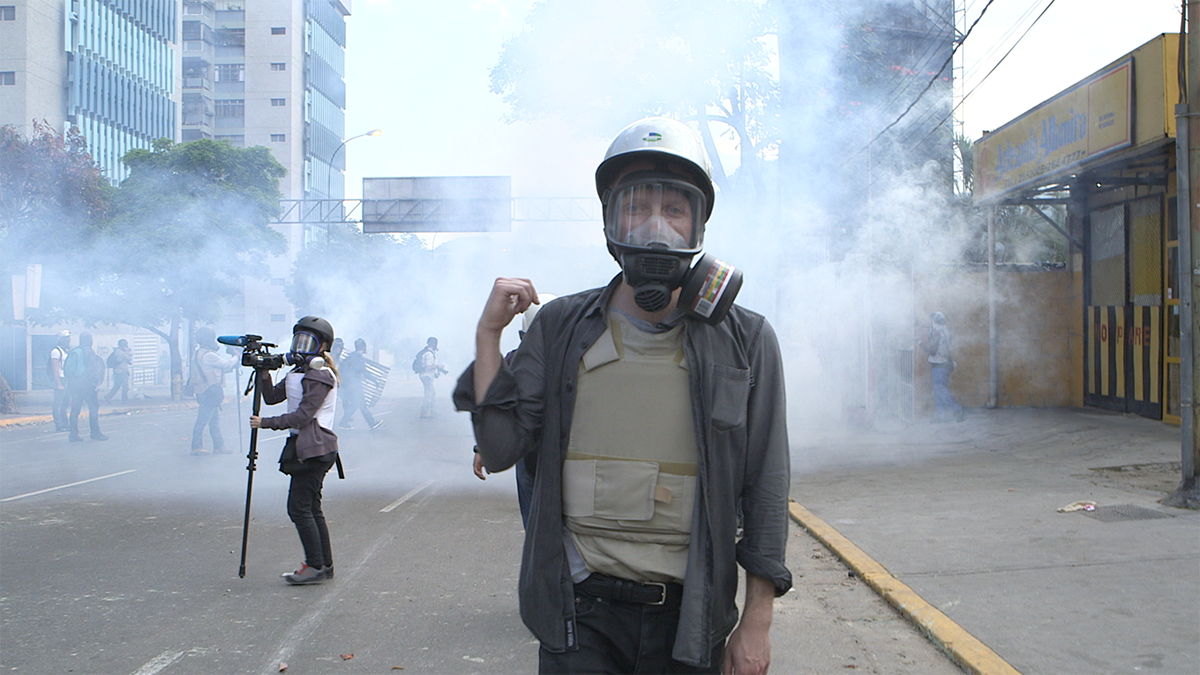
Alex Miller, reporting in 2014 during anti-government protests in Caracas, Venezuela
Alex Miller is global head of content at Vice Media, overseeing the media company’s 10 digital channels, in addition to the monthly print magazine’s website Vice.com. Miller, who began his career at the British magazine New Musical Express (NME), has been with Vice since 2008, first as an online editor and eventually as editor in chief of the company’s U.K. content before transitioning to his new role earlier this year.
Founded as a Canadian punk music magazine in 1994, Vice has since relocated to Brooklyn and burgeoned into an international multimedia empire with bureaus in more than 30 countries. Along with digital channels centered on everything from food (Munchies) to electronic music (Thump) to mixed martial arts (Fightland), the company’s properties include a record label, a book publishing division, and a film and TV production studio, along with an HBO documentary series produced by Bill Maher. Vice’s news division has an often provocative approach to reporting and storytelling that some criticize as too reporter-focused, rather than news-focused.
Miller became familiar with Vice around the time he was in college, watching its 2007 documentary “Heavy Metal in Baghdad,” which tracks an Iraqi band during the end of Saddam’s reign. Miller lauded its immersive approach geared toward young audiences as an “incredibly cool way” to look at news and culture. “I saw it and I was like, ‘That’s it. That’s the future. Everybody else has to pack up and go home, because quite clearly there’s something important happening here.’”
Miller spoke at the Nieman Foundation in October. Edited excerpts:
On Vice’s style
For our video dispatches, you’ve got to remember the medium that they’re being watched on. This is being put out through YouTube, so you’re surrounded by links going back to previous articles written about a subject, and films that may explain the situation more in-depth. But one of the things we are conscious about is this idea of, What is it like to be there? How do you relate to the people? Our conversational tone, the way that we report on stories, is a lot like we’re telling our friends about it. I think that is the key to our success, and I think that is also how we manage to stand out.
I don’t think it’d be breaking news to tell anyone that, for a long time, it felt like news was the preserve of a certain type of person. There was a certain type of person, who looked a certain type of way, who spoke in a tone of voice that exists nowhere beyond the news realm. Guess what? That was exhausted a long time ago. We started to approach it in a new way, with a new tone of voice. That doesn’t necessarily mean swearing. That just means being normal, not acting like a drone.
On revenue streams
I think that one of the great benefits for us has been that—because we were originally a free magazine—when the Internet started demanding everything for free, it didn’t shock us in quite the same way that it shocked some other organizations. Frankly, we’re a brand for millennials, and a lot of millennials don’t anticipate having to pay for their content.
Now, look at our deal with HBO, look at our deal with Rogers in Canada, our deal with Antenna across a lot of southern Europe. We’re in Greece, Serbia, Germany, Italy, and France. We’ve got things coming in the U.K., and obviously the U.S. The bulk of our business model is about making and selling our content.
On lessons for mainstream media
I wouldn’t tell any organization how to run their business. I think it’s very easy to be very critical of grand old news organizations when actually they do fantastic work. Who’s going to sit here and say the BBC or The New York Times are bad at what they do? They’re not. They’re fantastic at what they do. The point is that we now live in a digital era, and it is limitless in space. What we’re able to do is come over and offer a different voice.
You probably read, if you’re interested, 20 or 30 different news sources in a day. We just want to be one of them, with a different perspective. When I worked in the U.K., people from the BBC would come in and they’d say, “How can the BBC be more like Vice?” I’d say, “No! The BBC is awesome for you, for me, for the British public.” Know what you are, and stick with it. Just look at The New Yorker. It hasn’t changed much, and it’s great.
At the same time, there are lessons to be learned. I often think that there’s been a real benefit for us being the outsider. In 2011, there were horrible riots in London. I was there with a Vice crew, and loads of other cameramen were finding it completely impossible to film out there. If you were BBC, ITV, or Channel 4 News, the kids were coming and attacking the cameras. But we just fit in, not because we’re clever but because it was a strange benefit of being from the outside. For years, we wouldn’t necessarily be getting interviews with the absolute top, with political behemoths. As such, we learned to talk to people to find out what’s going on in the streets.
On the multiplatform approach
In September, we aired “Fixing the System,” a documentary on HBO with President Obama visiting a prison. We thought, over the week leading up to it and the three weeks after it, let’s make sure that people know that this isn’t us coming and going, “Wham, bam. Look, here we are.” This is something we care about and something that we believe people should be focusing on, digging into, and paying attention to until things actually change. As such, we got our 10 digital channels to all write about prisons in America from different angles in the subjects that they are relevant to. Munchies, our food channel, wrote about the state of prison food. Motherboard, our tech channel, wrote about the insanely expensive rate of whatever the prison version of Skype is. Broadly, our women’s channel, wrote a lot about women’s issues in jail. Even Thump, our electronic dance music channel, managed to find angles to write about it. Then the documentary aired on TV, and we continued the series. A special edition of the magazine launched, which was about prisoners, as well, and all this time we were doing stuff on Snapchat Discover, too.
It does make me very excited because that’s TV, mobile, online, print, all focused on one idea. As we come to terms with the fact that we’re one of the few organizations able to actually do that, your mind starts to boggle.
On criticism of millennials
Millennials voted Obama into office. They fueled the Arab Spring with social media. They pushed for gay rights. They encouraged new waves of feminism on campus. They put “Black Lives Matter” on the front pages of newspapers. Edward Snowden is a millennial. Kendrick Lamar is a millennial. They are a passionate, engaged group of people. In 2020, one in three adults is going to be a millennial. That’s why we want to reach for them. That’s why we want to talk to them, because they’re more connected than any generation before. When they’re so clearly unafraid of change, it’s important that somebody’s reaching out to them because, right now, I think the only people who are doing a good job of that are bloody ISIS.
I can’t get my head around the people who talk about millennials being disengaged. I’ve never come across a more engaged generation. People have this myth that millennials have a short attention span. That’s nonsense. They have a great bullshit detector. If they think that something’s rubbish in the first 30 seconds, they’ll click off it. People stay and watch our videos for an average of 18 minutes.
It’s a myth that millennials have a short attention span. If they find rubbish, they’ll quickly click off. People watch our videos for an average of 18 minutes
On reporter safety
There is absolutely nobody sent anywhere by Vice who doesn’t have the training, who doesn’t have the support that they need. We have rigorous practices. I know this because I helped to put them together. We do hostile environment training. Everything you would expect from every standard news organization is covered. If you think our correspondents are inexperienced—they may be young, but they’re not inexperienced, and they’re not untrained. We take this incredibly seriously. We’re not morons, sending children into danger. This is real, important work.
Frankly, the situation in Turkey [where a Vice journalist has been imprisoned] says a lot more about the Turkish regime than it does about our journalists who are still there. If anybody wants to write about Mohammed Ismael Rasool, our fixer who’s still in a prison in Turkey, please do. Please write about it, please tweet about it, because we’ve got to keep the pressure on these people who imprisoned an innocent man under outrageous and false allegations.
On the next five years
Obviously there will be technological innovations that are going to shape it. Who knows? I guess whether it’s Facebook posting native articles or things like Apple News becoming the new front page of the Internet, those will be important innovations. I still think it should be about the people who are putting together the best stories. It doesn’t matter what platform it is. It doesn’t matter if you’re reading a magazine or watching a documentary. Ultimately, the only thing that matters is a good story. Ultimately, it has to be a good story, well told.


